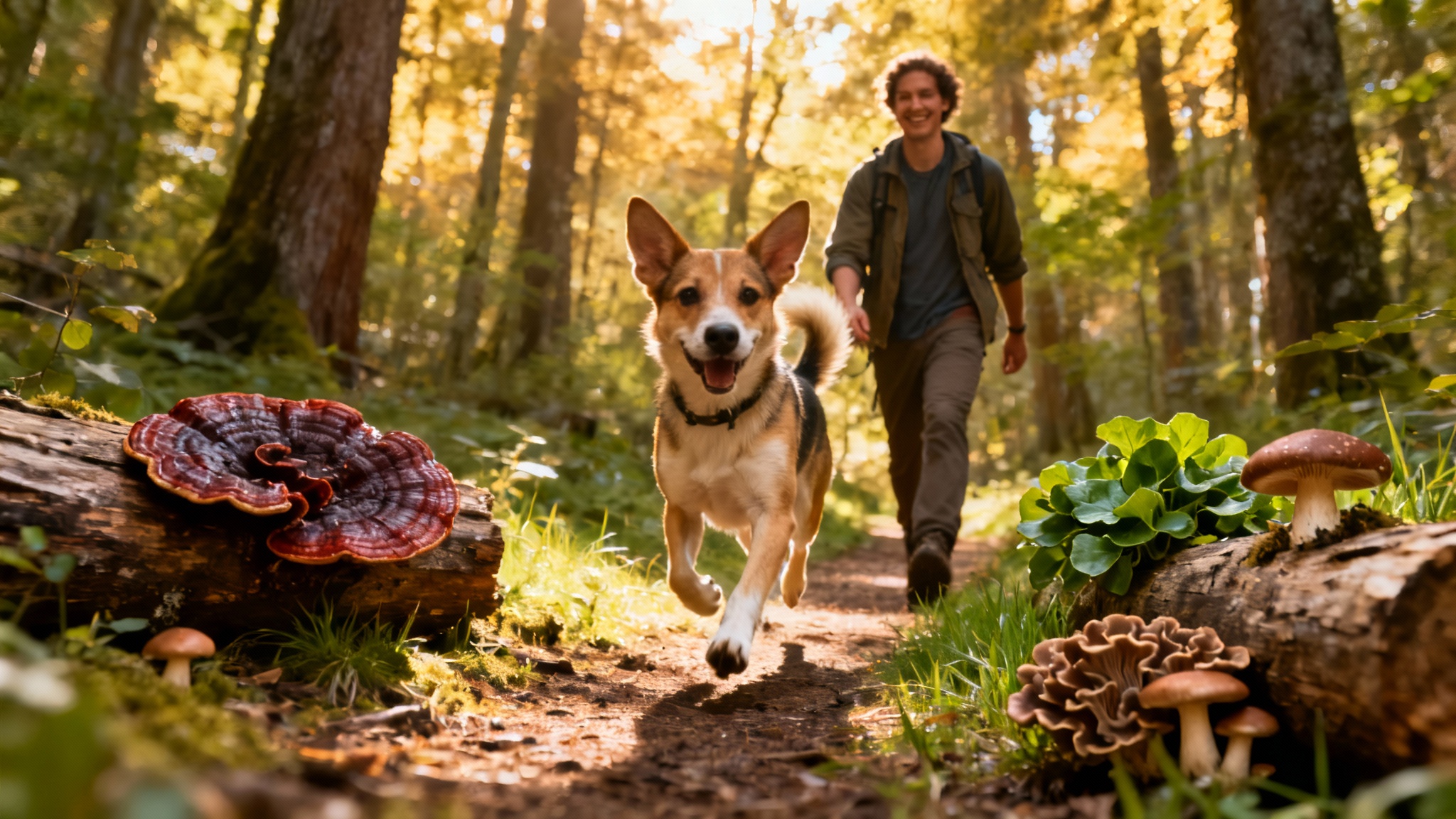Joint issues are among the most common challenges for aging dogs. Stiff mornings, hesitancy on stairs, and shorter walks chip away at the quality of life. While staples like glucosamine, chondroitin, omega-3s, and physical therapy remain central, many pet parents now look to canine-safe mushrooms as a gentle add-on.
Why Mushrooms Deserve a Place in Canine Joint Care
The connection between dogs and mushrooms is gaining recognition as more studies highlight the therapeutic compounds found in these fungi. What makes mushrooms interesting is their diverse portfolio of bioactive compounds.
Particular species provide beta-glucans, triterpenes, antioxidants, and unique polysaccharides that can help the body’s normal inflammatory balance and general resilience. Because chronic, low-grade inflammation often underlies joint discomfort, supporting healthy immune signaling may translate to more effortless movement and better day-to-day comfort.
Quick reminder: Never feed wild or unidentified mushrooms. Use only pet-safe, commercially prepared products and talk with your veterinarian if your dog has any medical conditions or takes medications.
How Mushrooms May Support Your Dog’s Joints
Inflammation Modulation
Joint stiffness often flares when immune signaling runs hot. Mushrooms such as reishi and maitake are well known for beta-glucans and triterpenes that help the body maintain a normal inflammatory response. Balanced signaling means less “background noise” around the joints, which can support day-to-day comfort.
Antioxidant Defense
Over time, oxidative stress affects cartilage and synovial tissues. Shiitake and turkey tail provide polyphenols and other antioxidant compounds that neutralize free radicals that can harm their joint tissue.
Cartilage and Activity Support
Mobility is a use-it-or-lose-it system. For a long time, Cordyceps has been recognized for its ability to support stamina and promote healthy oxygen utilization. Easy exercise helps keep your dog’s muscles strong and stable, which in turn helps their joints.
The Gut-Joint Connection
An inflamed gut could cause other body parts to become inflamed. Mushroom polysaccharides are prebiotic fibers that support beneficial microbes and gut barrier integrity. If your dog’s stomach environment is steadier, then their immune balance will be more constant. That’s great news for sensitive joints.
Meet the Mushrooms: Canine-Safe All-Stars
Reishi (Ganoderma lucidum)
Why it is used: Immune balance, normal inflammatory response, general calm. Best for: A Stiff dog who also needs a nudge toward relaxation. Good to know: Naturally bitter. Many formulas blend reishi with other mushrooms for a softer taste.
Reishi Snapshot
-
Rich in triterpenes and beta-glucans
-
Often paired with turkey tail or shiitake.
-
If your dog takes blood thinners or has a bleeding disorder, use with the direction of a veterinarian.
Maitake (Grifola frondosa)
Why it is used: Robust source of beta-glucans for immune support. Best for: Dogs who need everyday wellness support alongside joint care. Good to know: Typically well tolerated in powders and soft chews.
Maitake Snapshot
-
Helps maintain balanced immune signaling
-
Often combined with reishi for a “balancing” blend.
Turkey Tail (Trametes versicolor)
Why it is used: Antioxidant and general vitality support. Best for: Dogs needing broad wellness support with gentle joint benefits. Good to know: A staple in many canine mushroom blends.
Turkey Tail Snapshot
-
Noted for polysaccharide-K and other polysaccharides
-
Gentle option to pair with omega-3s for a “foundational” stack
Cordyceps (Cordyceps militaris)
Why it is used: Support for healthy energy and endurance. Best for: Dogs who move stiffly at first but loosen up with activity. Good to know: Often added pre-walk or pre-play (follow product label).
Cordyceps Snapshot
-
Traditional reputation for supporting oxygen utilization
-
Pairs well with measured, low-impact exercise plans
Shiitake (Lentinula edodes)
Why it is used: Antioxidants plus supportive minerals for overall joint wellness. Best for: Everyday use to complement core joint supplements. Good to know: One of the most palatable options; commonly used in daily blends.
Shiitake mushrooms also provide essential minerals that help maintain healthy bones, making them a supportive choice for long-term joint care.
Shiitake Snapshot
-
Offers lentinan and micronutrients
-
Often included to round out multi-mushroom formulas.
How Mushrooms Complement Traditional Joint Care
Mushrooms are adjuncts, not replacements. The most successful joint plans layer multiple supports.
Basic supplements: glucosamine, chondroitin, MSM, and omega-3s.
A lifestyle that includes weight management, activities like swimming, low-impact exercise, traction on the floors of the home, and comfortable bedding.
-
Animals benefit from a veterinary exam when indicated. The animal may receive radiographs. There are therapy options available, including hydrotherapy.
Think of mushrooms as background support that helps the body’s systems stay balanced while you continue proven, first-line joint strategies.
Safety First: Smart Guidelines For Pet Parents
-
Use canine-specific products from reputable brands. Avoid wild or unidentified mushrooms.
-
Check the label for species names, part used (ideally fruiting body), extraction method (hot water or dual), and beta-glucan content.
-
Start low and go slow. Introduce gradually and follow the manufacturer’s directions or your veterinarian’s guidance.
-
Talk to your vet before use if your dog is on medications (especially blood thinners, diabetes meds, or immunosuppressants), is pregnant or nursing, or has liver or bleeding disorders.
-
Watch for GI changes when you introduce anything new to the diet. Temporarily pause and call your vet if you see concerning effects.
How To Choose A Mushroom Product For Dogs
What to look for on the label
-
Species and part: Indication of mycelium on grain rather than fruiting body species and part.
-
Standardization: Beta-glucan content specified a quality indicator.
-
Extraction: Hot-water or dual extraction for bioavailability.
-
Testing: Testing is done for the purity and heavy metals by third parties.
-
Additives: Avoid adding too many sweet, salty, and artificial flavours.
Formats that fit real life
-
Powders: easy to sprinkle on meals
-
Chews or capsules: precise, travel-friendly
-
Broths: for picky eaters who prefer savory toppers
A Gentle Four-Week Introduction Plan
Make sure you always follow the label on your product as well as the advice from your veterinarian. The timeline below is a general acclimation template – not a dosing chart.
Week 1: During the first week, start giving a small quantity with one meal and observe for GI tolerance. Week 2: Continue daily; place near the main meal for consistency. Week 3: Consider pairing with core joint supports if not already (omega-3s, joint nutraceuticals). Week 4: Evaluate comfort on stairs, willingness to play, and post-walk recovery. Keep notes to share at your next vet check.
Tip: Consistency matters more than occasional “big” servings. Make it a habit.
Simple Ways To Serve Mushrooms To Dogs
-
Mix the powder into moist food or a small spoon of plain pumpkin purée.
-
Blend with low-sodium bone broth and pour over kibble or fresh diets.
-
Tuck a capsule inside a soft pill pocket for easy delivery.
Signs Of Progress To Track (And Discuss With Your Vet)
-
Smoother transitions from sitting to standing
-
More enthusiasm for walks and play.
-
Easier stair use or car entry
-
Less stiffness after naps
-
Improved “overall vibe” and willingness to explore
Remember that joint care is a slow-and-steady project. Mushrooms support the foundation while your primary joint plan does the heavy lifting.
FAQs
Are mushrooms safe for dogs?
Commercial, canine-safe mushroom products from reputable brands can be appropriate for many dogs when used as directed. Never feed wild mushrooms, and consult your veterinarian before starting any supplement.
Which mushrooms are most common for joint wellness?
Reishi, maitake, turkey tail, shiitake, and cordyceps are popular in dog formulas for immune balance, antioxidant support, and activity support.
Can mushrooms replace glucosamine or my dog’s medications?
No. Mushrooms are adjuncts. Continue your prescribed plan and discuss any changes with your veterinarian.
How long until I see results?
Many pet parents track small changes within 3 to 6 weeks, though timelines vary. Keep a simple mobility journal to share at checkups.
Should I choose the fruiting body or the mycelium?
Labels that specify fruiting body and list beta-glucan percentage help you evaluate quality. Brands vary; ask for testing data if unsure.
Can I give mushrooms to a dog with allergies or GI issues?
Introduce gradually and monitor. Dogs with complex medical histories should have vet guidance before adding any supplement.
Are there dogs that should avoid mushrooms?
Use caution and talk to your vet if your dog is on blood thinners, immunosuppressants, or diabetes medications, or has liver or bleeding disorders, is pregnant, or nursing.
What is the best form to use?
Choose the format you can give consistently – powder, capsule, chew, or broth. Consistency beats perfection.
Can I cook store-bought culinary mushrooms for joint benefits?
Culinary mushrooms can be healthy in moderation, but therapeutic products are standardized for active compounds. Avoid seasonings, onions, and garlic.
Do mushrooms help younger, athletic dogs?
They can be part of a prehab plan alongside fitness, surface traction, cross-training, and omega-3 fatty acids, especially for active breeds.
Conclusion: A Natural Ally For Happier, Easier Movement
Mushrooms are not a miracle cure. They are quiet helpers that support your dog’s own systems-immune balance, antioxidant defenses, and day-to-day vitality. Paired with proven joint routines and veterinary oversight, canine-safe mushrooms can be a brilliant, gentle addition that helps your dog greet each morning with more comfort and confidence.


